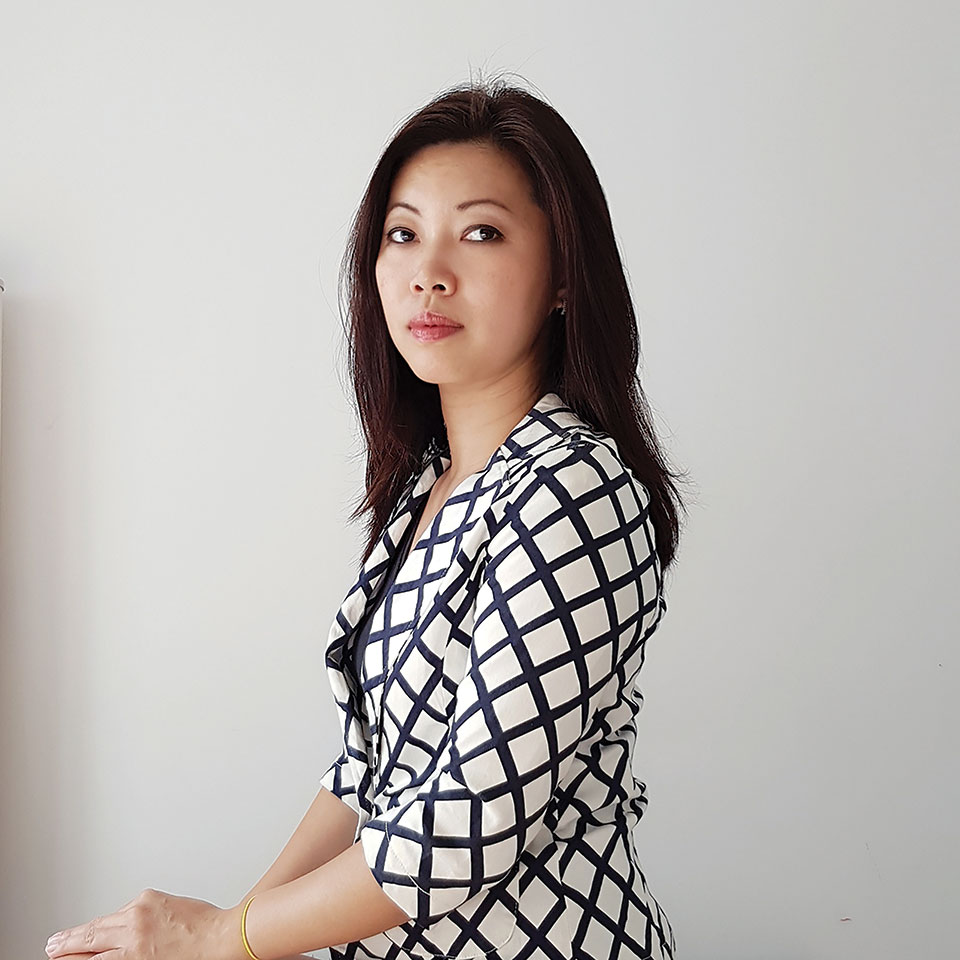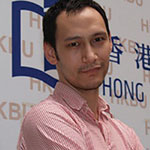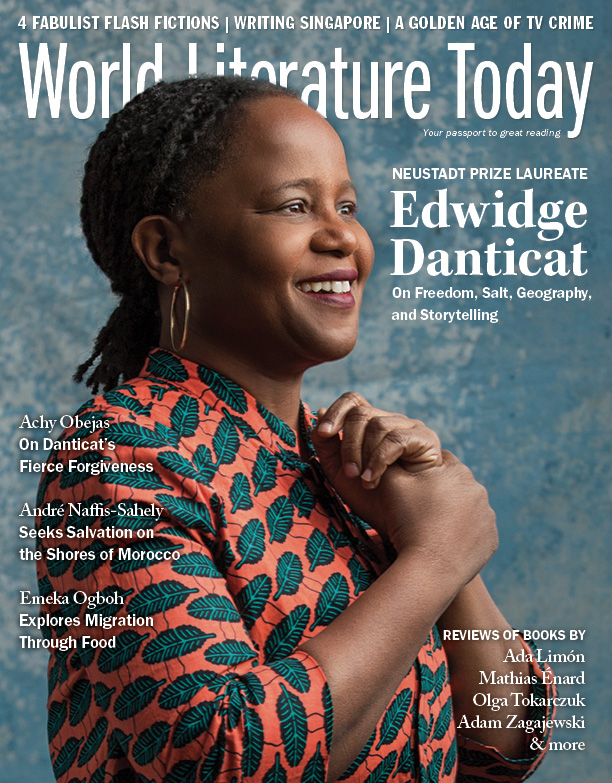Writing Singapore: Anglophone City Poetics and the Asian Experience: A Conversation with Grace Chia

Grace Chia is the author of the poetry collections womango, Cordelia, and Mother of All Questions, the short-story collection Every Moving Thing That Lives Shall Be Food, and a novel, The Wanderlusters. She is also the editor of We R Family, an anthology about alternative families. Her work has been anthologized in many publications and translated into German, French, Serbo-Croat, Chinese, and Portuguese. The 2011–2012 NAC-NTU Writer-in-Residence, she has been awarded residencies in Macau and Korea. Her haiku collaboration with Dutch photographer Marcel Heijnen on a book about Hong Kong garage dogs was published in 2018.
Here she discusses her home city, Singapore, including how now, in her own work, she is able to write with a different perspective, escaping its stranglehold and entering rapidly, much like Neo in The Matrix.
Tammy Lai-Ming Ho & Jason Eng Hun Lee: How many years in total have you spent in your home city of Singapore? How many years have you spent outside it?
Grace Chia: About thirteen years outside of Singapore. I moved to London for a relationship for about five to six years, then followed the boyfriend who became my husband for seven years traveling with Cirque du Soleil for Varekai, one of its many touring shows throughout North America, various parts of Europe, Australia, and Asia. My return to Singapore was due to my acceptance (and successful application) for the NAC-NTU Writer-in-Residence program that I did for a year and then staying on at NTU as an adjunct lecturer.
Tammy & Jason: How often do you write about Singapore? What aspects of it attract your attention? When you write about it, do you feel obliged to portray it in particular ways?
Grace: More often now (consciously) after my return to Singapore than before. Before, while I was abroad, I had the typical conflict of feeling sutured about identity issues when I was in my twenties. The ambivalence was driven by a lack of control about my personal narrative, which translated into anger, I believe. Added to that were issues of gender and race as a minority (being Asian and living predominantly in white-centric countries such as the UK, US, Australia, and Europe) and being Singaporean-Chinese in which our geography is miniscule, our culture relatively new and unknown to the outside world, and our politics fraught with accusations (sometimes not unfounded) of human-rights violations.
Upon my return, I was already in my late thirties and had become a mother of two with plenty of travel experience under my belt. I was a more self-assured woman, having stitched my own tapestry of multiple narratives, knew how to fight for myself emotionally and verbally, and was confident enough to embrace many ambiguities about myself and my country without losing ground in a debate. With this as the backdrop to my newfound identity, my writing has also evolved. I now write about my city with a different perspective, which allows me to escape its stranglehold and also enter rapidly, much like Neo in The Matrix, knowing I am empowered from within to not become lost in the minefield of its narrational clutches. So yeah, I guess intellectually and literarily, I see myself as a superhero of sorts who is both mortal and immortal enough to dictate how the story of my city should read and be written, and not the other way round (how I should be read and be written).
I particularly like to write about the disjunctive realities of Singapore, meaning posing mixed metaphors about new versus old, nature versus city, beauty versus grotesque, rich versus poor, haves versus have-nots, small versus large, male/masculine versus female/feminine. I like to blend these realities into events within settings that one can view easily like tableaux, which makes use of my acting-drama training, as blocking is a technique on stage that is not dissimilar to blocking parts/props/persons in a poem/prose. Effective staging in this manner tells a lot about class and politics in its various interpretive facets (social, cultural, economic, historical). For example, my poems “Before Paradise Is Lost,” “Dog Paddling,” and “A Portrait of a Young Girl as an Artist,” present children as characters who are wiser than their years, who teach adults through their actions much more about life and meaning than deliberate words uttered by educated adults. These poems also touch on aspects of struggle, loss, nature, nurture, love, where Paradise particularly makes local reference to Singapore.
I do not know if I’m obliged consciously to write about Singapore, although I admit I feel a certain responsibility to document my response to Singapore, particularly having aged since my first book was published, and knowing how ephemeral time is, how much change my city undergoes, and wanting to retain some mental-photographic imagery of the city I have returned to after a decade. I feel like I’m retelling my city to a part of myself I had lost or neglected, meaning, the me who should’ve been here in those thirteen years and crafted a narrative more similar to my Singaporean counterparts and relations, that me didn’t have a chance to exist, and this different me, in a somewhat quantum leap, exists in the same spot with different life experiences, knowledge, and issues, writes about this Singapore, which has also undergone its own transformation. So in a way, I feel a responsibility to capture these capsules of comprehension from this unique perspective and also, perhaps, knowing how much of a public figure I have become (before, as a poet, I was writing essentially for myself; now, I’ve grappled with the fact that I am also writing for a sympathetic public, that I am also (re)writing history), my writing has elevated to a more macroscopic level regarding topics, themes, tone, technique, etc. I am not interested in the purely confessional or experimental but the social, cultural, historical implications that my writing may have on the future generation.
I would say about 10 to 15 percent of my poetry is specifically about Singapore. The rest deals with other topics: relationships, love, life, identity, etc.
Tammy & Jason: Has living outside of an urban environment affected how you represent the city in your writing?
Grace: No. I am one of the lucky few who grew up in a kampong until I was eleven or twelve. I had the opportunity to explore a more rural setting when I was a child, barefoot amid trees (rambutans, mangoes, limes, coconuts), with a sizable pond, a well behind the house, chicken coops beside the house, shrubbery, outdoor toilet, etc. After leaving the kampong, I grew up in a Housing and Development Board flat in one of the most Chinese-dominated and overpopulated constituencies (Ang Mo Kio, which had one of the highest numbers of local residents, was a constituency run by a current and a former prime minister) until I left for the UK in 1998.
I believe those formative years left an indelible impression on me, and I’ve always tried to hark back to a more innocent period of my life where space is unencumbered. I’ve lived now in many, many cities (five years in London and seven years touring with Cirque du Soleil across North America, Europe, Australia, and Asia with my husband, who worked as a violinist for the company), and while I appreciate the logistical conveniences of living in an urban landscape, I also appreciate the tranquillity and space offered by a less urban environment. Some of the places I’ve lived are in downtown areas, and others are in more suburban locales. I am able to adapt to both easily and make the best of both, meaning, I don’t get vexed if I’m not in a city but will be resourceful enough to find a way to cope with less convenience (especially with modern technology, it is easy enough to find ways to have things delivered to one’s doorstep). This ease with both the urban and rustic translates into my writing, I think, as I have affection for both landscapes. There is no distaste for either.

A writer needs to be open-minded about a city like Singapore, which is constantly changing and thus unsure of itself in the dialogue of the world.
Tammy & Jason: How do you think a city is best narrated?
Grace: With open-mindedness, constant curiosity, and certain ambivalence. I find the last rather important as a singular perspective of affection or hatred translates to propaganda or vitriol, both of which are hard to stomach. A writer needs to be open-minded about a city like Singapore, which is constantly changing and thus unsure of itself in the dialogue of the world. Where does it stand? Who is it? How does it go forward (and backward)? Why is it relevant to itself, its people, and the world? Plenty of questions about a city that is also a state and nation—a city that cannot be pinned down to one set of rubrics. A writer also needs to be constantly curious about a city because it’s impossible to know all there is to know when it is so multicultural and diverse; so investigating and reading and being curious about narratives other than the ones the writer knows will help bulk up the writer’s content.
Tammy & Jason: Is there any particular aesthetic or poetic style that you use to represent your home city?
Grace: In my first book, womango, I experimented with several concrete poems as a way of seeing my city as a compression of sorts, a small island packed with much growth, people, and material things, and the concrete poem with a compacted space on a white page seemed like the perfect physical manifestation of an island floating on the ocean of globalization.
The poems I wrote for Cordelia and my upcoming collection are more traditional in style, in free verse, though lately, in recent years, I’ve gotten interested in a different sort of compression of text. Some poems are written and then structured in a block shape, almost like a nondescript apartment building, especially the shorter poems. Some poems are written with only one full stop right at the end of the poem, punctuated only with commas, colons, semicolons, and dashes, to give the impression of continuous movement—breathless, urgent, and relentless, not dissimilar from the way the energies of the city behave, dynamically and ceaselessly journeying round-the-clock.
Tammy & Jason: Have any recent events (social or political events, changing demographics, economic downturns) been a catalyst to your writings about Singapore?
Grace: Yes, the influx of foreigners is a theme I’ve written about in poetry and prose. In the past few years, I’ve taken up a full-time office job in the public sector and have made brief reference to the monotony and corporatization of individual identities. That said, I think my prose has more reflections on my thoughts about current affairs than poetry, as I prefer to keep poetry a more symbolic medium with more ambiguity for perspectives than prose. One of my new epic poems, “From Holland to Singapore,” scopes the entire island of Singapore and the changes that have transformed the city not just physically but linguistically (the different names of streets and constituencies) and also gastronomically (the increase of world cuisines as a nod to greater cosmopolitanism).
Tammy & Jason: What issues or difficulties have you faced in writing about Asian identity?
Grace: How to write about the Asian experience without the lens of orientalism, exoticization, and self-deprecation. How to write about landmarks, landscape, objects, people, and symbols without being tokenistic, disrespectful, dismissive, exaggerating, or stereotyping. How to express the mundane in the Asian experience as art and the extraordinary as relatable. There is no singular Asianness and hence no need to boil down diversity into oneness. I try to write from my perspective of that moment (time-specific) to capture the essence of a lived experience, which is the best way of being authentic and, perhaps, meaningful.
Tammy & Jason: How do you think your home city is perceived around the world culturally (particularly in terms of literature), socially, and economically?
Grace: I think people who have never lived in Singapore often think of Singapore as a straight-laced, money-obsessed city-state that is soulless and a cultural desert. Only those with vested interests in the arts of Singapore or who have done some research on global arts (to mean literature as well) will know that Singapore offers an interesting East-West blend of culture unique to this place. The many languages that Singapore embraces and spoken by its people, including patois (Singlish) and dialects, appearing in literature and plays, for example, add a unique ethnic flavor not found in cities in China and Southeast Asia, and the fluency of English used by Singaporean artists/writers allows Singaporean work to be easily understood by English-speaking audiences all over the world.
I think people who have never lived in Singapore often think of Singapore as a straight-laced, money-obsessed city-state that is soulless and a cultural desert.
Tammy & Jason: Do you see the city as an inclusive or alienating place, or both? How might this sentiment be represented in the public and/or private spaces of Singapore?
Grace: Both. The predominance of high-rise residential buildings in Singapore is a practical solution to land-starved Singapore that has created greater isolation among its residents as vertical living has not proven to be conducive to communal camaraderie. However, the city of five million within a compressed space also means it is an inclusive physical space that forces people to interact constantly together, regardless of choice. The city is a paradox; a conundrum.
Tammy & Jason: If the city could answer your questions, what would you ask it? Why are these important issues to you?
Grace: Can you regenerate? Turn barren soil to fertile? Can you feel the pain each time your land is being dug and redug for new construction? Do you even want us there? Do you want to swallow us up, make us all disappear? Have we taken too much from you? What would you want us to do, if given the chance to redo history all over again?
Tammy & Jason: Also let’s consider the reverse. What would your city ask you? Why?
Grace: Why are you doing all this to me without permission? Who do you think you are? You’ve uprooted my forests and drained my lagoons and planted plastic trees and reservoirs in place. What’s wrong with you? Can you all get out?
Tammy & Jason: What do you think of anglophone poets from Hong Kong or Singapore? What advantages or disadvantages do you think they face?
Grace: Anglophone poets from Singapore and Hong Kong are often multilingual, at least verbally, even if not linguistically to a literary level. To quote from the movie Arrival, if learning a new language rewires one’s brain, then the ability to contain a few languages (or dialects) in one’s brain means a brain that has already been rewired differently from a monolingual brain, that translates to different perspectives, the ability to frame context and content differently; hence, even when writing about the city, anglophone poets from Hong Kong and Singapore have a unique perspective when writing about their home cities in a language that is burdened with a colonial heritage, a borrowed language of the West, while the Asian embodiment of their cultural/ethnic identities lends an even more nuanced interpretation of the cityscape. The disadvantages these poets face are that they have also inherited a literary tradition and canon embedded with cultural baggage that they may not necessarily identify with through lineage. References are intellectual rather than emotive or personal (for example, Asian poets cannot relate to Seamus Heaney’s “Digging” in the same way that an Irish man with a father who used to be a miner would). The cultural disconnect of an anglophone literary tradition from Asian modernity in Singapore and Hong Kong is understandably inevitable.
Through confession, exaggeration, fabrication, and recollection, literature has given more color and flavor to the face of the Singaporean or the Singapore resident, no longer just a number and statistic or a nameless, faceless homogenous member of a collective but a human individuated by differences, fleshed out and alive, living immortally through metaphor and words.
Tammy & Jason: Overall, what impact have local poetry, literature, and the arts made on the cultural imaginary of Singapore? How has this altered or added to existing perspectives of the city?
Grace: Local literature, whether prose or poetry, has added more personable, authentic and alternative stories to Singapore. The re/construction of narratives in both fiction and nonfiction (assuming some poems are nonfiction, too) genres adds to the historical and archival stories of the everyman, the lower classes, the marginalized, who may otherwise have been omitted from institutional documentation. Through confession, exaggeration, fabrication, and recollection, literature has given more color and flavor to the face of the Singaporean or the Singapore resident, no longer just a number and statistic or a nameless, faceless homogenous member of a collective but a human individuated by differences, fleshed out and alive, living immortally through metaphor and words.
June 2018














